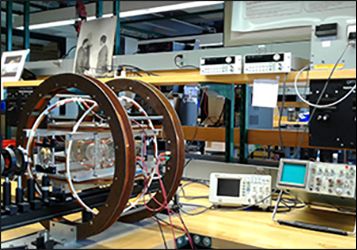Description

Optical Pumping experiment equipment.
Rubidium vapor in a weak (~.01-10 gauss) magnetic field controlled with Helmholtz coils is pumped with circularly polarized D1 light from a rubidium rf discharge lamp. The degree of magnetization of the vapor is inferred from a differential measurement of its opacity to the pumping radiation.
In the first part of the experiment the energy separation between the magnetic substates of the ground-state hyperfine levels is determined as a function of the magnetic field from measurements of the frequencies of rf photons that cause depolarization and consequent greater opacity of the vapor. The magnetic moments of the ground states of the 85Rb and 87Rb isotopes are derived from the data and compared with the vector model for addition of electronic and nuclear angular momenta.
In the second part of the experiment the direction of magnetization is alternated between nearly parallel and nearly antiparallel to the optic axis, and the effects of the speed of reversal on the amplitude of the opacity signal are observed and compared with a computer model. The time constant of the pumping action is measured as a function of the intensity of the pumping light, and the results are compared with a theory of competing rate processes - pumping versus collisional depolarization.
Lab Guide
Optical Pumping of Rubidium Vapor Lab Guide (PDF)
References
Bell, William E., and Arnold L. Bloom. "Optical Detection of Magnetic Resonance in Alkali Metal Vapor." The Physical Review 107, no. 6 (1957): 1559-1565.
Bloom, Arnold. " Optical Pumping (PDF)." Scientific American (October 1960).
Optical Pumping (PDF)." Scientific American (October 1960).
De Zafra, R. L. "Optical Pumping." American Journal of Physics 28 (1960): 646.
 Bernheim, Robert. Optical Pumping - An Introduction. New York, NY: W.A. Benjamin, 1965.
Bernheim, Robert. Optical Pumping - An Introduction. New York, NY: W.A. Benjamin, 1965.
Benumof, R. "Optical Pumping Theory and Experiment." American Journal of Physics 33 (1965): 151-160.
Nagel, M., and F. E. Haworth. "Advanced Laboratory Experiments on Optical Pumping of Rubidium Atoms—Part I: Magnetic Resonance." American Journal of Physics 34 (1966): 553-558.
Kukolich, S. G. "Time Dependent of Quantum-State Amplitudes Demonstrated by Free Precession of Spins." American Journal of Physics 36 (1968).
 Richtmyer, Floyd K., E. H. Kennard, and John N. Cooper. "Atomic Structure and Optical Spectra." In Introduction to Modern Physics. 6th ed. New York, NY: McGraw-Hill, 1969, pp. 269-305. ISBN: 9780070525061.
Richtmyer, Floyd K., E. H. Kennard, and John N. Cooper. "Atomic Structure and Optical Spectra." In Introduction to Modern Physics. 6th ed. New York, NY: McGraw-Hill, 1969, pp. 269-305. ISBN: 9780070525061.
 Semat, Henry, and John Albright. "Optical Spectra and Electronic Structure." Chapter 9 in Introduction to Atomic and Nuclear Physics. 5th ed. New York, NY: Holt, Rinehart and Winston, 1972, pp. 256-300. ISBN: 9780030854026.
Semat, Henry, and John Albright. "Optical Spectra and Electronic Structure." Chapter 9 in Introduction to Atomic and Nuclear Physics. 5th ed. New York, NY: Holt, Rinehart and Winston, 1972, pp. 256-300. ISBN: 9780030854026.
 Evans, Robley D. "Atomic and Molecular Effects of Nuclear Moment Parity, and Statistics." Chapter 5 in The Atomic Nucleus. Malabar, FL: R. E. Krieger, 1982, c1955, pp. 181-187. ISBN: 9780898744149.
Evans, Robley D. "Atomic and Molecular Effects of Nuclear Moment Parity, and Statistics." Chapter 5 in The Atomic Nucleus. Malabar, FL: R. E. Krieger, 1982, c1955, pp. 181-187. ISBN: 9780898744149.
Selected Resources
Bell, William E., Arnold Bloom, and James Lynch. "Alkali Metal Vapor Spectral Lamps." Review of Scientific Instruments 32 (1961): 688-692.
Brewer, Richard G. "High Intensity Low Noise Rubidium Light Source." Review of Scientific Instruments 32 (1961): 1356-1358.
Shernoff, Donald I. "Mercury Lamp for Optical Pumping." Review of Scientific Instruments 40 (1969): 1418-1419.
